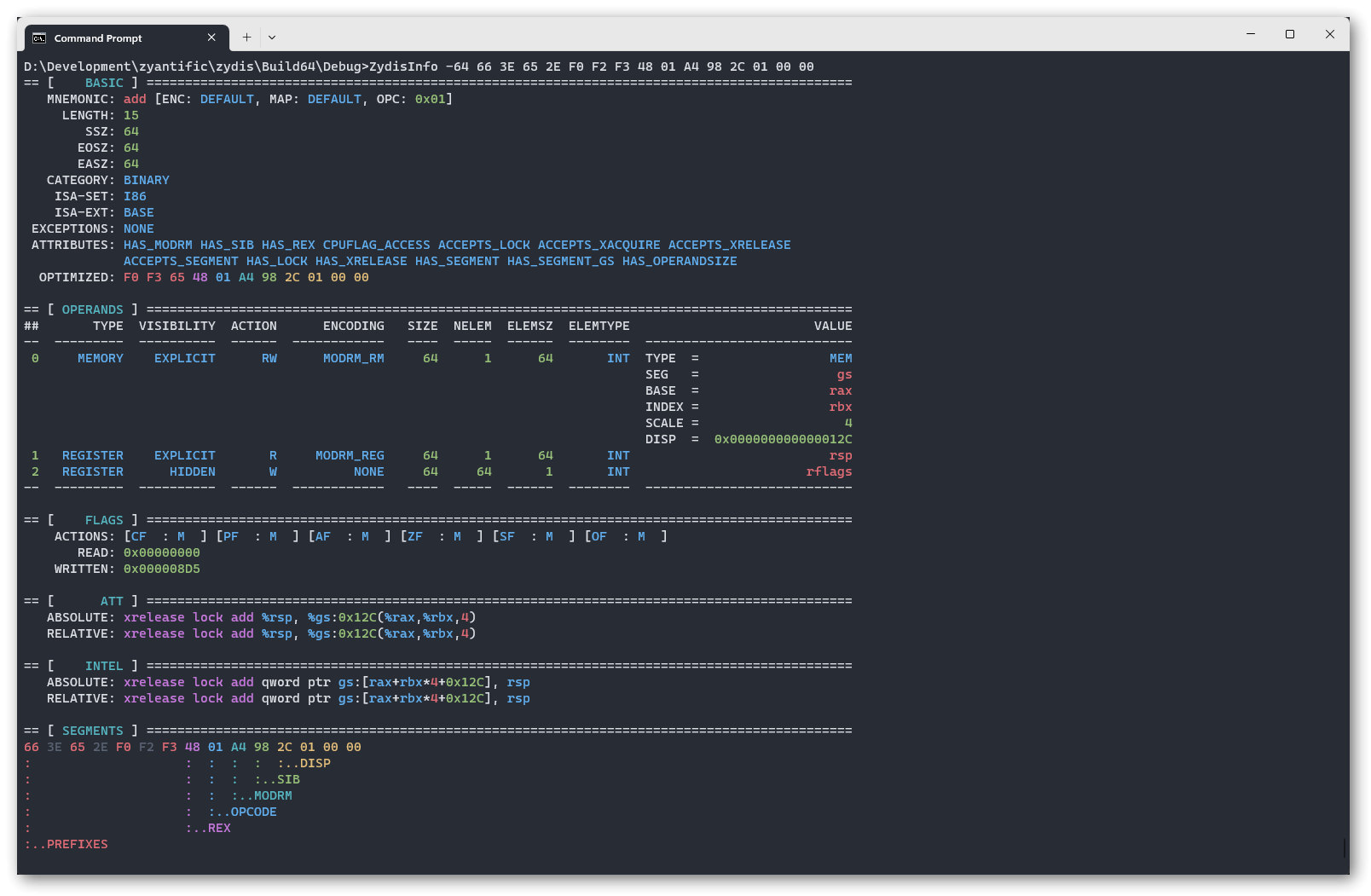Fast and lightweight x86/x86-64 disassembler library.
- Supports all x86 and x86-64 (AMD64) instructions.
- Supports pretty much all ISA extensions (list incomplete):
- FPU (x87), MMX
- SSE, SSE2, SSE3, SSSE3, SSE4.1, SSE4.2, SSE4A, AESNI
- AVX, AVX2, AVX512BW, AVX512CD, AVX512DQ, AVX512ER, AVX512F, AVX512PF, AVX512VL
- ADX, BMI1, BMI2, FMA, FMA4
- Optimized for high performance
- No dynamic memory allocation ("malloc")
- Very small file-size overhead compared to other common disassembler libraries
- Complete doxygen documentation
- No dependencies on platform specific APIs
- Should compile on any platform with a complete libc and CMake
- Tested on Windows, macOS and Linux
- Language bindings [v2.0 final]
- Tests [v2.0 final]
- Graphical editor for the instruction-database [v2.0 final]
- Implement CMake feature gates. Currently, everything is always included. [v2.0 final]
- Encoding support [v2.1]
The following example program uses Zydis to disassemble a given memory buffer and prints the output to the console.
#include <stdio.h>
#include <Zydis/Zydis.h>
int main()
{
uint8_t data[] =
{
0x51, 0x8D, 0x45, 0xFF, 0x50, 0xFF, 0x75, 0x0C, 0xFF, 0x75,
0x08, 0xFF, 0x15, 0xA0, 0xA5, 0x48, 0x76, 0x85, 0xC0, 0x0F,
0x88, 0xFC, 0xDA, 0x02, 0x00
};
// Initialize decoder context.
ZydisDecoder decoder;
ZydisDecoderInit(
&decoder,
ZYDIS_MACHINE_MODE_LONG_64,
ZYDIS_ADDRESS_WIDTH_64);
// Initialize formatter. Only required when you actually plan to
// do instruction formatting ("disassembling"), like we do here.
ZydisFormatter formatter;
ZydisFormatterInit(&formatter, ZYDIS_FORMATTER_STYLE_INTEL);
// Loop over the instructions in our buffer.
uint64_t instructionPointer = 0x007FFFFFFF400000;
uint8_t* readPointer = data;
size_t length = sizeof(data);
ZydisDecodedInstruction instruction;
while (ZYDIS_SUCCESS(ZydisDecoderDecodeBuffer(
&decoder, readPointer, length, instructionPointer, &instruction)))
{
// Print current instruction pointer.
printf("%016" PRIX64 " ", instructionPointer);
// Format & print the binary instruction
// structure to human readable format.
char buffer[256];
ZydisFormatterFormatInstruction(
&formatter, &instruction, buffer, sizeof(buffer));
puts(buffer);
readPointer += instruction.length;
length -= instruction.length;
instructionPointer += instruction.length;
}
}The above example program generates the following output:
007FFFFFFF400000 push rcx
007FFFFFFF400001 lea eax, [rbp-0x01]
007FFFFFFF400004 push rax
007FFFFFFF400005 push qword ptr [rbp+0x0C]
007FFFFFFF400008 push qword ptr [rbp+0x08]
007FFFFFFF40000B call [0x008000007588A5B1]
007FFFFFFF400011 test eax, eax
007FFFFFFF400013 js 0x007FFFFFFF42DB15
Zydis builds cleanly on most platforms without any external dependencies. You can use CMake to generate project files for your favorite C99 compiler.
# Linux and OS X
git clone 'https://github.com/zyantific/zydis.git'
cd zydis
mkdir build && cd build
cmake ..
make- Intel (for open-sourcing XED, allowing for automatic comparision of our tables against theirs, improving both)
- LLVM (for providing pretty solid instruction data as well)
- Christian Ludloff (http://sandpile.org, insanely helpful)
- LekoArts (for creating the project logo)
- Our contributors on GitHub
Zydis is licensed under the MIT license.

